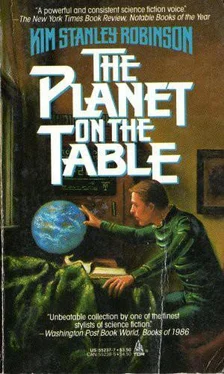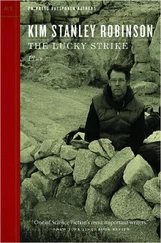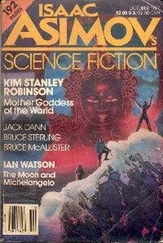His guardian saint, the monks had decided, was Anne, mother of the Virgin Mary and grandmother of Jesus. He owned a small wooden medallion with her face painted on it, which Abbot Alonso had given to him. Now he took the medallion between his fingers, and looked in the tiny brown dots that were the face’s eyes. “Please, Mother Anna,” he prayed silently, “take me from this ship to my home. Take me home.” He clenched the tag in his fist so tightly that the back of it, carved so that a cross of wood stood out from its surface, left an imprinted red cross in his palm. Many hours passed before he fell asleep.
Two days later the Most Fortunate Invincible Armada left Corunna, this time without the flags, or the crowds of spectators, or the clouds of priestly incense trailing downwind. This time God favored them with a westerly wind, and they sailed north at good speed. The ships were arranged in a formation devised by the soldiers, orderly phalanxes rising and falling on the swells: the galleasses in front, the supply hulks in the center, and the big galleons on either flank. The thousands of sails stacked on hundreds of masts made a grand and startling sight, like a copse of white trees on a broad blue plain.
Manuel was as impressed by the sight as the rest of the men. There were four hundred men on La Lavia , and only thirty were needed at any one time to sail the ship, so all of the three hundred soldiers stood on the sterncastle observing the fleet, and the sailors who were not on duty or sleeping did the same on the slightly lower forecastle.
Manuel’s duties as a sailor were simple. He was stationed at the port midships taffrail, to which were tied the sheets for the port side of the mainmast’s sails, and the sheets for the big lateen-rigged sail of the foremast. Manuel helped five other men pull these ropes in or let them out, following Laeghr’s instructions; the other men took care of the belaying knots, so Manuel’s job came down to pulling on a rope when told to. It could have been more difficult, but Laeghr’s plan to make him a topman like the other Africans aboard had come to grief. Not that Laeghr hadn’t tried. “God made you Africans with a better head for heights, so you can climb trees to keep from being eaten by lions, isn’t that right?” But when Manuel had followed a Moroccan named Habedeen up the halyard ladder to the main top, he found himself plunging about space, nearly scraping low foggy clouds, and the sea, embroidered with the wakes of the ships ahead, was more often than not directly below him . He had clamped, arms and legs, around a stanchion of the main top, and it had taken five men, laughing and cursing, to pry him loose and pull him down. With rich disgust, but no real physical force, Laeghr had pounded him with his cane and shoved him to the port taffrail. “You must be a Sicilian with a sunburn.” And so he had been assigned his station.
Despite this incident he got on well with the rest of the crew. Not with the soldiers; they were rude and arrogant to the sailors, who stayed out of their way to avoid a curse or a blow. So three-quarters of the men aboard were of a different class, and remained strangers. The sailors therefore hung together. They were a mongrel lot, drawn from all over the Mediterranean, and Manuel was not unusual because of his recent arrival. They were united only in their dislike and resentment of the soldiers. “Those heroes wouldn’t be able to conquer the Isle of Wight if we didn’t sail them there,” Juan said.
Manuel became acquainted first with the men at his post, and then with the men in his berth. As he spoke Spanish and Portuguese, and fair amounts of Arabic, Sicilian, Latin, and a Moroccan dialect, he could converse with everyone in his corner of the lower foredeck. Occasionally he was asked to translate for the Moroccans; more than once this meant he was the arbiter of a dispute, and he thought fast and mistranslated whenever it would help make peace. Juan, the one who had made the bitter comments to Laeghr on Manuel’s arrival, was the only pure Spaniard in the berth. He loved to talk, and complained to Manuel and the others continuously. “I’ve fought El Draco before, in the Indies,” he boasted. “We’ll be lucky to get past that devil. You mark my words, we’ll never do it.”
Manuel’s mates at the main taffrail were more cheerful, and he enjoyed his watches with them and the drills under Laeghr’s demanding instruction. These men called him Topman or Climber, and made jokes about his knots around the belaying pins, which defied quick untying. This inability earned Manuel quite a few swats from Laeghr’s cane, but there were worse sailors aboard, and the sailing master seemed to bear him no ill will.
A life of perpetual change had made Manuel adaptable, and shipboard routine became for him the natural course of existence. Laeghr or Pietro, the the natural course of existence. Laeghr or Pietro, the leader at Manuel’s station, would wake him with a shout. Up to the gundeck, which was the domain of the soldiers, and from there up the big ladder that led to fresh air. Only then could Manuel be sure of the time of day. For the first week it was an inexpressible delight to get out of the gloom of the lower decks and under the sky, in the wind and clean salt air; but as they proceeded north, it began to get too cold for comfort. After their watches were over, Manuel and his mates would retire to the galley and be given their biscuits, water and wine. Sometimes the cooks killed some of the goats and chickens and made soup. Usually, though, it was just biscuits, biscuits that had not yet hardened in their barrels. The men complained grievously about this.
“The biscuits are best when they’re hard as wood, and bored through by worms,” Habedeen told Manuel.
“How do you eat it then?” Manuel asked.
“You bang pieces of biscuit against the table until the worms fall out. You eat the worms if you want.” The men laughed, and Manuel assumed Habedeen was joking, but he wasn’t certain.
“I despise this doughy shit,” Pietro said in Portuguese. Manuel translated into Moroccan Arabic for the two silent Africans, and agreed in Spanish that it was hard to stomach. “The worst part,” he offered, “is that some parts are stale while others are still fresh.”
“The fresh part was never cooked.”
“No, that’s the worms.”
As the voyage progressed, Manuel’s berthmates became more intimate. Farther north the Moroccans suffered terribly from the cold. They came belowdecks after a watch with their dark skins completely goose-pimpled, like little fields of stubble after a harvest. Their lips and fingernails were blue, and they shivered an hour before falling asleep, teeth chattering like the castanets in a fiesta band. Not only that, but the swells of the Atlantic were getting bigger, and the men, since they were forced to wear every scrap of clothing they owned, rolled in their wooden berths unpadded and unprotected. So the Moroccans, and then everyone in the lower foredeck, slept three to a berth, taking turns in the middle, huddling together like spoons. Crowded together like that the pitching of the ship could press them against the beams, but it couldn’t roll them around. Manuel’s willingness to join these bundlings, and to lie against the beams, made him well-liked. Everyone agreed he made a good cushion.
Perhaps it was because of his hands that he fell ill. Though his spirit had been reconciled to the crusade north, his flesh was slower. Hauling on the coarse hemp ropes every day had ripped the skin from his palms, and salt, splinters, belaying pins and the odd boot had all left their marks as well, so that after the first week he had wrapped his hands in strips of cloth torn from the bottom of his shirt. When he became feverish, his hands pulsed painfully at every nudge from his heart, and he assumed that the fever had entered him through the wounds in his palms.
Читать дальше












